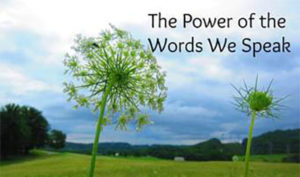Spiritual traditions the world over value the use of special language, words that impart particular meaning, in prayers, mantras, and transmissions. In some stories about the Buddha, it is said that just hearing certain teachings can bring good fortune for the spiritual path. The Bible says: In the beginning was the Word, and the Word was with God, and the Word was God. In the Jewish mystical tradition of Kabbalah, divine and angelic names give power to those who are worthy and capable of receiving it.
And words take on a special significance in other ways. A magician says “Abracadabra.” No one knows the exact origin of the word Abracadabra, yet it is associated with phrases in Hebrew which mean “I will create as I speak,” and the Aramaic “I create like the word.”
Whatever your religious beliefs—or lack of them—it is obvious that words have power. You have undoubtedly been both stung and comforted by someone else’s—or your own—words.
In your daily lives, what words do you entertain? What words do you focus on? Words can be used to harm or to heal, to encourage or discourage, to inspire or deflate.
Most people have a running monologue filled with many kinds of words, often too many. Meditation helps us clear the constant static and find the space in which we can rest and contact deeper sources of wisdom. But there is language that can help us to create stories that serve us instead of dragging us down. As author Mark England states: “Stories eventually shape and create our realities. Words to stories, stories to realities. This is the  power of language.”
power of language.”
Here is some advice from the teachings of “Abraham” (Esther Hicks) on how to shape your language:
- Make it generally feel believable. General and soothing.
- Tell the story in a way that shifts your emotion as you tell it.
- Start practicing the story that resonates with who you really are.
- You have to find the way of thinking the thought that gives you relief before the things around you can change.
- Tell the story the way you want it to be.
“Words are singularly the most powerful force available to humanity. We can choose to use this force constructively with words of encouragement, or destructively using words of despair. Words have energy and power with the ability to help, to heal, to hinder, to hurt, to harm, to humiliate and to humble.”
—Yehuda Berg
